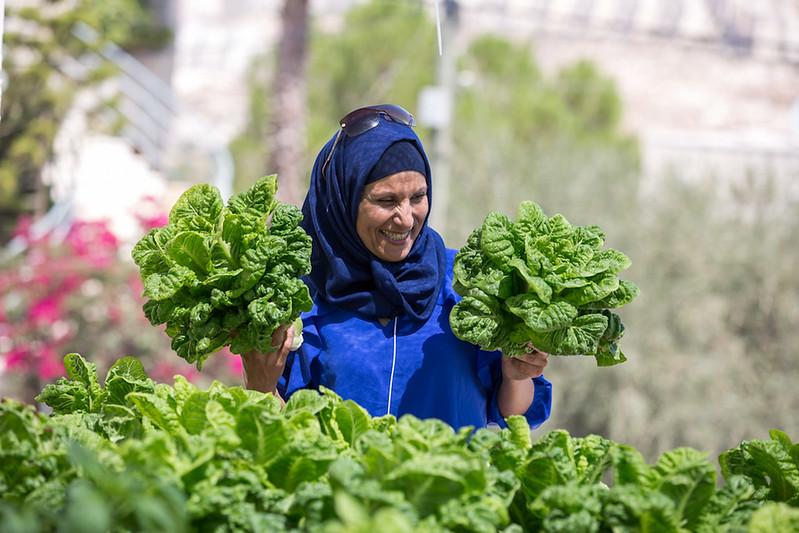Gaza food connections – Towards resilient women-led urban agroecological farming initiatives

The following project description dates from early 2022. The project was deeply affected by the recent conflict. This page will be updated with more news, soon.
Context
The agricultural sector in Gaza is facing a series of challenges, including the continuing blockade that results in a heavy reliance on expensive imported inputs, significant population pressure, pollution threats, and limited access to and degraded natural resources, particularly soil and water. These intersecting challenges are exacerbated by climate variability and change, and now the Covid-19-related health crisis has complicated the situation further.
Farming in Gaza today is characterised by urban and peri-urban agriculture, typically comprising micro-, small- and medium-size initiatives, many of which are led by women. Shortages of food, fuel, energy and clean water differentially compromise advances in women’s political, civil, social and economic participation, which exacerbates their vulnerability to multiple shocks – health, social, environmental, climate and political.
Despite their prominent role in the food and farming sector, less than 5% of women own agricultural land, constraining decision-making over land-use and investments. With their contribution largely unrecognised, women remain in the shadow economy and their precarity is further heightened by Covid-19.
The project
‘Gaza Foodways’ aims to support a shift towards women-led agricultural research, practice and policy formulation for a just transition to diversified low-carbon urban farming systems and food sovereignty. As transdisciplinary research, the project engages primarily with women producers and processors as co-researchers to articulate and frame their challenges, bringing them together with women-led research teams to stimulate knowledge co-creation for solution-building that amplifies their collective voices and results in a series of user-led innovations for urban agroecology.
Working with and across Gazan universities, the project will promote participatory action research practice and strengthen capacity and skills for gender-transformative transdisciplinary curricula, developing a professional urban agroecology diploma. It will also establish supportive inter-sectoral actor-networks mobilised around strategic policy changes that connect up and strengthen policies for urban agroecology and food sovereignty in Gaza.
Objectives
Objective 1: Investigative knowledge co-creation with women-led enterprises to open up pathways for improved economic participation.
Objective 2: Respect and connect layers of knowledge for adaptive co-learning between ‘food system actor-networks’ and academic institutions across Gaza to co-generate challenge-led innovations for urban agroecology.
Objective 3: Advance alternative learning opportunities and policy frameworks for urban food systems that respond to the needs, and amplify the voices of women and young people.
Partners
- Palestinian Hydrology Group for Water and Environmental Resources Development
- Gaza Urban and Peri-Urban Agriculture Platform
- University College of Applied Science (Gaza)
- Centre for Agroecology, Water & Resilience, Coventry University (UK)
Activities
- To establish five inter-sectoral Food System Actor-networks (FSAs) that co-generate & implement collaborative action plans.
- To award 3-4 Challenge Prizes to transdisciplinary women-led research teams for the co-development of technical or social innovations with the Urban Women’s Agripreneur Forum (UWAF).
- To support and integrate three new food groups into UWAF for improved adaptive capacity for agroecological production, processing and economic participation.
- To develop and launch an innovative professional diploma in Urban Agroecology & Food Sovereignty, and prepare 10 women producers for professional engagement in extension.
- To develop and advocate for an urban agroecology policy in Gaza and its inclusion in city planning considerations related to land and resource allocation.
Contact
For more details on the project please contact:
Ayman Rabi - ayman@phg.org

